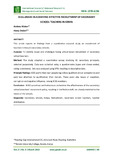| dc.contributor.author | Makori, Andrew | |
| dc.contributor.author | Onderi, Henry | |
| dc.date.accessioned | 2018-03-27T09:19:43Z | |
| dc.date.available | 2018-03-27T09:19:43Z | |
| dc.date.issued | 2013-03 | |
| dc.identifier.citation | International Journal of Advanced Research in Management and Social Sciences Vol. 2 | No. 3 | March 2013 | en_US |
| dc.identifier.issn | 2278-6236 | |
| dc.identifier.uri | http://www.academia.edu/5450437/CHALLENGES_IN_ACHIEVING_EFFECTIVE_RECRUITMENT_OF_SECONDARY_SCHOOL_TEACHERS_IN_KENYA_INTRODUCTION | |
| dc.identifier.uri | http://hdl.handle.net/123456789/3007 | |
| dc.description.abstract | This article reports on findings from a quantitative research study on recruitment of teachers in Kenya’s secondary schools. Purpose: To identify issues and challenges facing school-based recruitment of secondary school teachers. Method: The study adopted a quantitative survey involving 81 secondary principals, selected purposively. Data was collected using a questionnaire (open and closed-ended, rating scale items). Data was analysed using SPSS resulting in descriptive data. Principle findings: BOG wants their own people regardless qualifications or competence and paid less attention to qualification than clanism. There were also issues of nepotism, corruption and negative influence, among BOG members. Conclusion: BOG’s practices and behaviours undermine the effectiveness of the secondary schools teachers’ recruitment policy, resulting in ineffective staff, not closely matched to the needs of the schools | en_US |
| dc.language.iso | en | en_US |
| dc.subject | Secondary schools | en_US |
| dc.subject | Kenya | en_US |
| dc.subject | Recruitment | en_US |
| dc.subject | secondary school Teachers | en_US |
| dc.subject | Teacher distribution | en_US |
| dc.title | CHALLENGES IN ACHIEVING EFFECTIVE RECRUITMENT OF SECONDARY SCHOOL TEACHERS IN KENYA | en_US |
| dc.type | Article | en_US |

